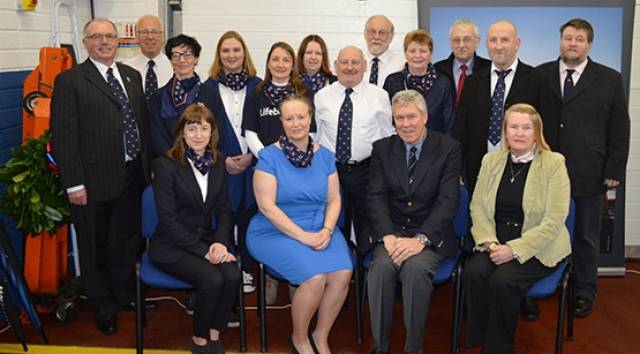Friends and supporters of Fethard RNLI gathered together at the lifeboat station this weekend on the one hundred and second anniversary of the Mexico disaster, where nine lifeboat crew lost their lives off the Wexford coast, to launch an appeal for a new lifeboat. As the current lifeboat Trade Winds nears the end of its service, an 18-month appeal has been launched to raise the €65,000 needed for a new D class lifeboat.
Opening the proceedings Fethard RNLI Chairman John Hearne remembered those lifeboat crew lost 102 years ago. He said, ‘Walking through the station today you will see pictures of those men and that previous lifeboat (Helen Blake) and you may think that there is a world of difference between then and now. Of course now the lifeboats look completely different and the technology today is a world apart but it all counts for nothing without the crew. The RNLI is still the same charity that it was in 1914 and the work it does of saving lives at sea is still carried out by volunteers in exactly the same tradition.’
‘The technology marches on and soon this lifeboat will have completed ten years arduous service. The very best way that we in the community can support this fine crew is to give them the best equipment and training to do what can be a most difficult job.’
Colin Williams RNLI Divisional Operations Manager acknowledged the role played by the community twenty years ago when the station reopened followed its closure after the Mexico tragedy.
Colin said, ‘When the RNLI looked at reopening Fethard the old lifeboat station was being used by local fishermen. It’s a testament to the community’s feeling toward the lifeboat service that they returned it to the RNLI and Fethard RNLI reopened. Since then there have been many notable rescues. The volunteers crew here today are the custodians of the lifeboat service and we owe much to the local committee, twenty years ago, who lobbied so hard to have the RNLI look again at having a lifeboat stationed at Fethard.
Fethard RNLI Fundraising Chairperson Oonagh Hearne spoke on the challenges of raising €65,000 for the new lifeboat. ‘We have a very strong committee and we are going to do our very best. Everyone who lives on the peninsula knows how much we need this lifeboat and we have already had many expressions of support and interest. We will be keeping everyone updated our events and I want to thank those who have already pledged their support.’
Niamh McCutcheon, a member of the RNLI Council of Ireland travelled especially to Fethard for the launch to officially launch the appeal. Addressing the crowd she said, ‘The community of Fethard and its friends will be the donors of your new lifeboat. You have an eighteen month journey ahead to raise the funding and it will be hard work but rewarding work. After which you will know that every time that new lifeboat launches, every one of you made it possible. Every life saved or person helped to safety by your new lifeboat will be a community effort because your community funded your new lifeboat.’
The occasion also served to recognise the contribution of two Fethard RNLI volunteers who in different ways have served the station with distinction. Hugh Burke a former helm with the lifeboat and a current launching authority was presented with a framed Letter of Thanks from the RNLI Chairman in recognition for his skill and split second decision-making during a daring rescue last March.
The callout was to a young man got into extreme difficulty after he launched a kayak near Baginbun Head when his dog fell down a very steep gully. His kayak overturned and he was trapped in a three metre wide gulley within a pool of water with submerged rocks. He was being pummelled by the broken water and was in imminent danger of being swept out to sea. Under the command of Helm Hugh Burke the lifeboat entered the gulley and along with his fellow crew, Nicolette Perrella and Stephen Byrne, they rescued the man.
Accepting the Letter of Thanks from the RNLI Hugh spoke of his time on the lifeboat crew and the affection for the station’s inshore lifeboat.
‘I remember coming down to the station 20 years ago to view the new D class inshore lifeboat. I wondered what can a little boat like this do to make a difference as I was used to bigger boats. But after training on it I was amazed at what this little boat can do. We have 12 lifeboat launching sites in the area and have carried out 258 launches on it. If our pagers went off now we have three lifeboat crew on standby to launch immediately and we know we have the right tool for the job.’
Also honoured was former Fethard RNLI Fundraising Chairman Hugh Stafford who recently stepped down from his role and who had been honoured with the Institution’s Gold Badge for his services to the charity.
The afternoon concluded with a wreath laying at the memorial for the nine lifeboat men who lost their lives during the rescue of the Mexico and was followed by a minutes silence by the assembled crowd.
































































